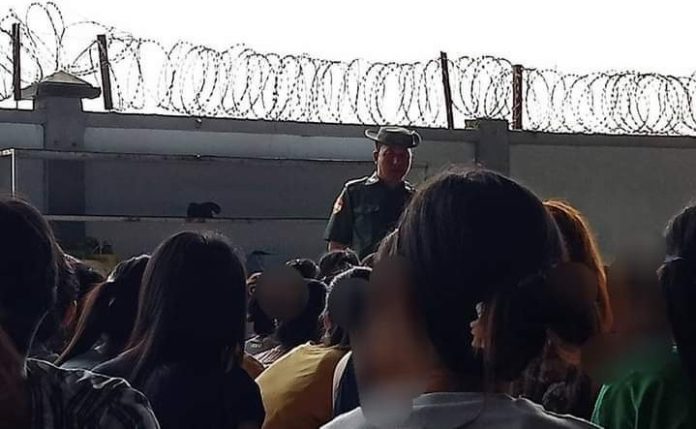*Wah Wah is a former employee at a Chinese-owned sports equipment factory in Wartayar Industrial Zone, located in Shwepyitha Township of Yangon Region. She was fired after reporting a case of sexual harassment against a workplace colleague.
“Workers’ complaints are ignored. [Management] does not even attempt to mediate,” she added.
Wah Wah was terminated by the factory without receiving the four warnings required by the employment contract she signed with management. The human resources team at the factory accused her of being rude to them, so they didn’t want to help her.
“Since I was fired unfairly, other workers began making demands. [The owner] summoned the military, and one of the workers in the group was slapped by a soldier,” Wah Wah recounted.
This incident in Shwepyitha was just one example of the human and labor rights violations workers in Myanmar face every day.
Since the 2021 military coup, workers’ unions have claimed that workers have been facing human rights violations that amount to modern-day slavery inside Myanmar’s factories.
The Universal Declaration of Human Rights (UDHR) states that: “No one shall be held in slavery or servitude. Everyone is entitled, in full equality, to a fair and public hearing by an independent and impartial tribunal.”
The UDHR goes on to state that: “Everyone has the right to freedom of opinion and expression. Everyone has the right to freedom of peaceful assembly and association. Everyone has the right to social security. Everyone has the right to work with just and favorable remuneration. Everyone has the right to form and join trade unions.”
Following the 2021 military coup, most of the factories still operating in Myanmar are now owned by Chinese nationals. They have aligned themselves with the military and are reportedly committing human rights violations, according to trade unions.
The Myanmar Garment Manufacturers Association (MGMA) stated in its August 2023 report that there are 817 member factories in Myanmar, but 271 have ceased operations.
The MGMA added that workers face unfair labor practices, such as being forced to work overtime, not receiving a fair wage, and not being paid on-time.
“There have been cases of workers losing arms or legs in the workplace, which are clear examples of human rights violations. Those who lost limbs were simply laid off without being notified [by management],” said Wah Wah.
The International Labor Organization (ILO) states that freedom of association and freedom of expression are defined as fundamental rights of workers.
Since 2021, the military has declared many labor organizations illegal, and some labor leaders have been arrested and jailed, causing many labor activists to go underground or to leave the country.
“During this period, the workers are afraid of being arrested with other charges, so they stop talking about serious issues, so the situation can be concluded as that the situation is getting worse,” said Myo Aye, a spokesperson at the Solidarity Trade Union of Myanmar (STUM).
Workers have reported that factory owners have paid bribes to regional military officials. When complaints arise in the factory, the owners call in the military to threaten the workers.
“If an incident occurs in the factory, the factory authorities either call the military or contact the highest official in Shwepyitha Township,” said a worker who spoke to DVB on the condition of anonymity, fearing for her safety.
“Workers who cannot finish the targeted number of clothing pieces are forced to walk on their knees, being cursed and hit, pushed around and physically and verbally abused,” said Moe Sandar Myint, the chairperson of the New Light Federations of Labor Unions – Myanmar (NLF – Myanmar).
The wage received by most factory workers is 4,800 kyat ($2.28 USD) per day with an additional allowance of 1,000 kyat (0.48 USD) since last year. They can earn from 5,800 to 6,800 kyat ($2.76-3.24 USD) per day total, according to workers.
There are more than 700 workers at garment factories in Yangon. Most garment workers are women. They are required to work more than eight hours per day depending on the daily targets.
Several said that their lunch and toilet breaks have been limited. Many fear losing their jobs due to the country’s deteriorating economic situation over the last three years.
The ILO stated that since 2021, 41 percent of workers were fired, and only 29.5 percent of them received any compensation. Women and youth workers received less compensation compared to their male counterparts.
Deputy General Secretary of the Confederation of Trade Unions of Myanmar (CTUM) Phyo Sandar Soe was elected as an executive member of the ILO.
She said that she is calling on ILO members to impose sanctions against the military regime in Naypyidaw, which seized the levers of government after it deposed Aung San Suu Kyi’s National League for Democracy (NLD) party, which was seen as more sympathetic to labor unions and workers’ rights.
The ongoing violations of human and labor rights in Myanmar shows the need for international attention to the plight of workers. The continued arrest of labor leaders for demanding workplace health and safety, or wage increases, has meant there is nothing to protect them from the regime’s lawfare against them.
As factory workers like Wah Wah, fired for taking a stand against sexual harassment, continue to push for change, additional support from the international community or pressure against the regime would be welcomed.
Wah Wah said that the rights violations she faced at the factory were so severe that she continued to work there thinking the situation would improve, but sadly it continued to worsen.
*name changed to protect identity



